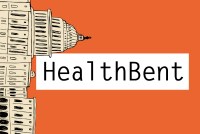Latest Morning Briefing Stories
Must-Reads Of The Week From Brianna Labuskes
Newsletter editor Brianna Labuskes wades through hundreds of health care policy stories each week, so you don’t have to.
One-On-One With Trump’s Medicare And Medicaid Chief: Seema Verma
Seema Verma, the administrator for the Centers for Medicare & Medicaid Services, sat down for a rare interview with KHN senior correspondent Sarah Varney. They discuss her views on President Donald Trump’s plan for sustaining public health insurance programs, how the administration would respond if Obamacare is struck down by the courts in the future and her thoughts on how the latest “Medicare for All” proposals would affect innovation and access to care.
Must-Reads Of The Week From Brianna Labuskes
Newsletter editor Brianna Labuskes wades through hundreds of health care policy stories each week, so you don’t have to.
Watch And Listen: The ACA In Limbo Again
KHN’s Julie Rovner is on PBS NewsHour and WBUR’s “Here & Now” to talk about the repercussions of a federal appeals court decision striking down the health law’s key requirement for people to get health coverage.
Demócratas debaten si es “realista” un Medicare para Todos
Los siete candidatos que participaron del último debate de 2019 hablaron sobre la practicidad de una reforma radical de la atención médica, específicamente, de Medicare para Todos.
Democrats Debate Whether ‘Medicare For All’ Is ‘Realistic’
Candidates again sparred over “Medicare for All” and other approaches to health reform — but this time they waited more than two hours before wading into health policy issues.
KHN’s ‘What The Health?’: ACA Still Under A Cloud After Court Ruling
A federal appeals court in New Orleans has agreed with a lower court that a key piece of the Affordable Care Act is unconstitutional. But it is sending the case back to the lower-court judge to decide how much of the rest of the law can stand. Also, Congress is leaving town after finishing work on a major spending bill that includes many changes to health policy. Margot Sanger-Katz of The New York Times, Kimberly Leonard of the Washington Examiner and Alice Miranda Ollstein of Politico join KHN’s Julie Rovner to discuss this and more.
Federal Appeals Court Strikes Down Portion Of Obamacare
The court, based in New Orleans, agreed with a federal judge in Texas that the individual mandate section of the Affordable Care Act could not stand after Congress eliminated the tax penalty for not having coverage. But the case now heads back to the lower court to see how much of the law can remain.
Corte federal de apelaciones derrumba crítica parte del Obamacare
Todavía queda por delante un largo proceso judicial que tiene que determinar las partes de la ley que pueden seguir adelante sin un mandato individual.
What Would Happen If The ACA Went Away?
The Affordable Care Act has been on the books for nearly a decade. Parts of it have become ingrained in our health system ― and in our everyday life. But this could change, depending on a long-awaited 5th Circuit Court of Appeals decision regarding the law’s constitutionality.
Must-Reads Of The Week From Brianna Labuskes
Newsletter editor Brianna Labuskes wades through hundreds of health care policy stories each week, so you don’t have to.
Californians Without Health Insurance Will Pay A Penalty — Or Not
Californians must have health insurance starting next year or face a hefty tax penalty. But, as with the now-defunct federal tax penalty for being uninsured, some people will be exempt.
Some Rejoice Over New California Health Insurance Subsidies. Others Get Shut Out.
There’s something new in this year’s Covered California open-enrollment period: Consumers are learning whether they will qualify for new state-funded financial aid. The results are mixed, with some scoring hundreds of dollars per month and others nothing.
KHN’s ‘What The Health?’: Legislate-A-Palooza
The House passed legislation that would give federal workers 12 weeks of paid parental leave. The measure appears headed for passage in the Senate, and President Donald Trump has promised to sign the measure into law. Meanwhile, House and Senate lawmakers have a tentative deal on surprise medical bills, but don’t count on a compromise just yet. Joanne Kenen of Politico, Kimberly Leonard of the Washington Examiner and Emmarie Huetteman of Kaiser Health News join guest host Mary Agnes Carey of KHN to discuss this and more. And for “extra credit,” the panelists offer their favorite health stories of the week they think you should read, too.
Supreme Court Seems Sympathetic To Insurers In Obamacare Case
Justices from the right and left ask whether Congress needs to keep its promises.
Cómo elegir un seguro de salud de manera inteligente
Las estadísticas muestran que la mayoría de las bancarrotas ocurren a causa de cuentas médicas. Por eso hay que elegir bien, para evitar facturas de horror.
Obamacare Back At The High Court — With Billions For Insurers On The Line
The case revolves around a health law provision designed to help insurers recover some losses because they had an unusually high number of sick and expensive customers. Insurers complain that when Republican lawmakers discontinued funding the program, it was like “Lucy Van Pelt pulling the football away from Charlie Brown.”
It’s Not Just You: Picking Health Insurance Is Hard. Here’s How To Be Smart About It.
It’s open enrollment season for health insurance. And choosing the best plan is tricky whether you have to buy insurance on your own or just figure out which plan to sign up for at work. Here’s what you need to know.
Must-Reads Of The Week From Brianna Labuskes
Newsletter editor Brianna Labuskes wades through hundreds of health care policy stories each week, so you don’t have to.
Candidatos apuestan fuerte por la salud. ¿Es lo que los votantes realmente quieren?
Una nueva encuesta revela que los votantes sí quieren que se hable de salud. Pero la pregunta del millón es: ¿apoyarán en las urnas un “Medicare para Todos”?.



















